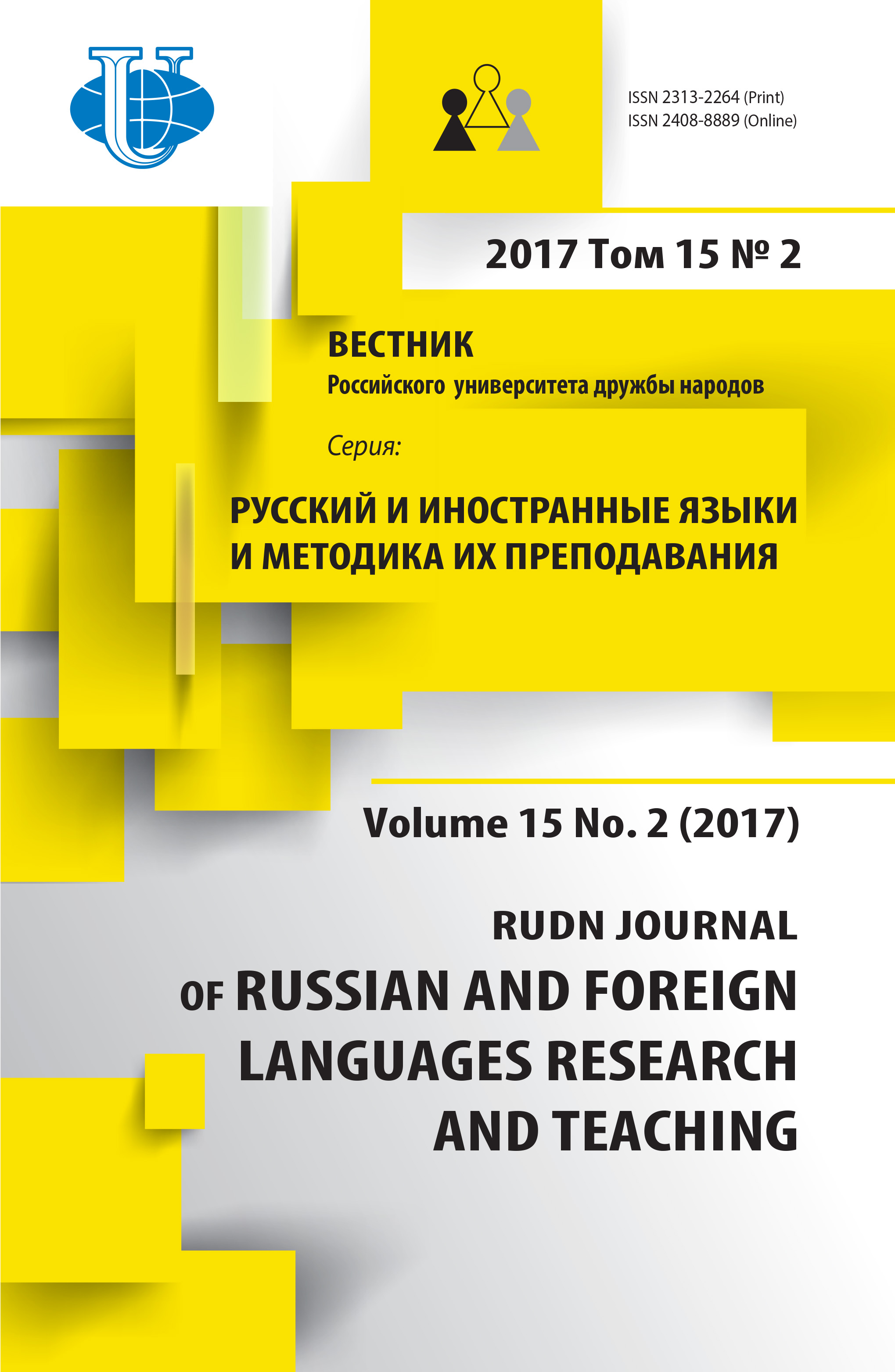PECULIARITY OF PERCEPTION OF FOREIGN IMAGE BY NATIVE RUSSIAN SPEAKERS (BASED ON SET EXPRESSIONS)
- Authors: Lapteva M.L.1
-
Affiliations:
- Federal State Budgetary Educational Institution of Higher Education “Astrakhan State University”
- Issue: Vol 15, No 2 (2017)
- Pages: 137-151
- Section: Articles
- URL: https://journals.rudn.ru/russian-language-studies/article/view/16194
- DOI: https://doi.org/10.22363/2313-2264-2017-15-2-137-151
- ID: 16194
Cite item
Full Text
Abstract
The relevance of the article is defined by the insufficient knowledge on the modern stage of development of linguistic thought for foreign images that can be representative for language consciousness of native Russian speakers.The purpose of this article is to identify cultural and linguistic potential of different groups of set expressions and to conduct a cross-cultural analysis of the perception of “alien” in the fragment of the national language picture of the world. The material for present research is based on set expressions that differ on the phaseological level by сognitive-discursive relations with foreign reality and that include a “foreign” component on the level of formal structure (Proletet kak fanera nad Parizhem/miss an opportunity, v Grezii est vse/It is an abundant place ed etc.).However, from the point of view of its activity and use frequency submitted material of set expressions is not always reflects the real communicative and pragmatic situation. The above cross-cultural analysis revealed trends of acculturation of “alien” in the Russian language consciousness. Phraseological verbalization of certain cultural images depends on its value and significance for the picture of the worldof members of the language and cultural community. Not all foreign images are fairly perceived by the native Russian speakers and therefore active realization of some codified set expressions is not always observed.
About the authors
Mariya Leonidovna Lapteva
Federal State Budgetary Educational Institution of Higher Education “Astrakhan State University”
Author for correspondence.
Email: hohlina2004@yandex.ru
Doctor of Philology, Professor of Modern Russian language department of the Federal State Budgetary Educational Institution of Higher Education “Astrakhan State University”
Tatishcheva str., 20a, Astrakhan, Russia, 414056References
- Bahtin M.M. Problemyi rechevyih zhanrov // Literaturno-kriticheskie stati. M.: Hud. lit., 1986. S. 34—57 (In Russ.)
- Krasnyih V.V. «Svoy» sredi «chuzhih»: Mif ili realnost? M.: Gnozis, 2003. 375 s. (In Russ.)
- Penkovskiy A.B. Ocherki po russkoy semantike. M.: Yazyiki slavyanskoy kulturyi, 2004. 406 s. (In Russ.)
- Serebrennikova A.N. Dialektnoe slovo s semantikoy «svoystvennosti» — «chuzhdosti»: avtoref. diss. ... kand. filol. nauk. Tomsk, 2004. (In Russ.)
- Petrochenko M.N. Semanticheskiy komponent «svoy» / «chuzhoy» v folklornom i dialektnom byitovom tekstah: diss. ... kand. filol. nauk. Tomsk, 2005. 227 s. (In Russ.)
- Vyihodtseva I.S. Kontsept «Svoy — Chuzhoy» v sovetskoy slovesnoy kulture (20—30-e gg.): diss. ... kand. filol. nauk. Saratov, 2006. 187 s. (In Russ.)
- Rahimbergenova M.H. Lingvokognitivnyie strategii otrazheniya obraza etnicheski «chuzhogo» v rossiyskoy presse: diss. ... kand. filol. nauk. Ekaterinburg, 2008. 192 s. (In Russ.)
- Skryilnikova A.Yu. Kategorialnaya i lingvokulturologicheskaya suschnost chuzhdosti v russkom yazyike: diss. ... kand. filol. nauk. Lipetsk, 2008. 293 s. (In Russ.)
- Bragina A.A. Chuzhoe-svoYo (ot zaimstvovaniya k slovotvorchestvu) // Grammatika i norma. M., 1977. 315 s. (In Russ.)
- Kashkin V.B. Markeryi svoego i chuzhogo v mezhkulturnom dialoge // Vzaimoponimanie v dialoge kultur: usloviya uspeshnosti. Chast 2. Voronezh: VGU, 2004. S. 49—62. (In Russ.)
- Grishaeva L.I., Tsurikova L.V. Vvedenie v teoriyu mezhkulturnoy kommunikatsii. M.: Akademiya, 2006. 336 s. (In Russ.)
- Zolotyih L.G. Kognitivno-diskursivnyie osnovyi frazeologicheskoy semantiki: monografiya. Astrahan: ID «Astrahanskiy universitet», 2007. 265 s. (In Russ.)
- Alieva N.N. Lingvokulturologiya, mezhkulturnaya kommunikatsiya i krosskulturnaya lingvistika // Rezhim dostupa: ttp://www.rusnauka.com /8._NPE_ 2007 /Philologia/19454.doc.htm. (In Russ.)
- Birih A.K., Mokienko V.M., Stepanova L.I. Russkaya frazeologiya. Istoriko-etimologicheskiy slovar. M.: Astrel: AST: Lyuks, 2007. 926 s. (In Russ.)
- Berkov V.P., Mokienko V.M., Shulezhkova S.G. Bolshoy slovar kryilatyih slov russkogo yazyika. M.: Russkie slovari, Astrel, AST, 2000. 624 s. (In Russ.)
- Entsiklopedicheskiy slovar kryilatyih slov i vyirazheniy / avt.-sost. V. Serov. M.: Izd-vo Lokid-Press, 2005. 880 s. (In Russ.)
- Vaysgerber Y.L. Rodnoy yazyik i formirovanie duha. M.: Izd-vo Moskovskogo un-ta, 1993. 223 s. (In Russ.)
- Gumboldt V. Yazyik i filosofiya kulturyi / V. fon Gumboldt. M.: Progress, 1985. 451 s. (In Russ.)
- Dobrovolskiy D.O. Natsionalno-kulturnaya spetsifika vo frazeologii (I) // Voprosyi yazyikoznaniya. 1997. № 6. S. 37—48. (In Russ.)
- Dobrovolskiy D.O. Natsionalno-kulturnaya spetsifika vo frazeologii (II) // Voprosyi yazyikoznaniya. 1998. № 6. S. 48—58. (In Russ.)
- Melerovich A.M. Faktoryi, motiviruyuschie smyislovoe soderzhanie frazeologizmov v tekste // Kulturnyie aspektyi v yazyike i tekste : sb. nauch. tr. Belgorod: Izd-vo BelGU, 2005. S. 127—135. (In Russ.)
- Mokienko V.M. Ideografiya i istoriko-etimologicheskiy analiz frazeologii // Voprosyi yazyikoznaniya. 1995. № 4. S. 3—13. (In Russ.)
- Yankovichova M. SvoYo i chuzhoe vo frazeologii yazyika: problemyi opredeleniya / M. Yankovichova // Rossica Olomucensia XXXVIII. Olomouc, 2000. (In Russ.)
Supplementary files














